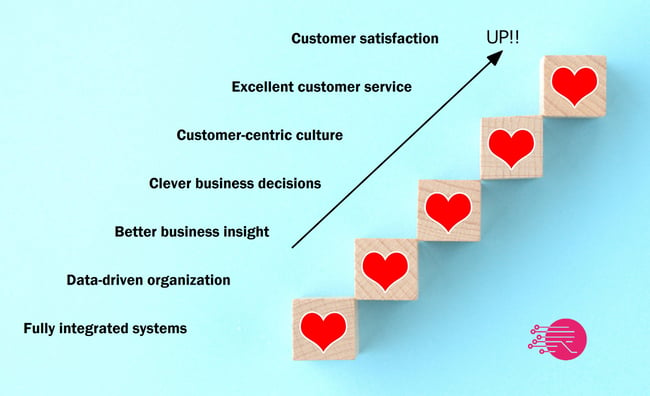IT leaders all over the world have a strong focus on providing management with better information. Reliable data empowers business executives to make better decisions.
Having data you can trust is just as important for the front line of your operations. Your customer-facing staff, those in charge of customer interactions, need accurate data.
Most of the decisions that matter to your customers are not made by management. They are made by customer-facing people. Boosting sales is top of mind of all company leaders. Most often, it can be achieved through enhanced customer service experience.
Spotless data empowers you and your customer operations to deliver just that: spotless and great customer service. This article will investigate how customer satisfaction and eventually increased sales are linked with highly reliable data. It will also show how data integration helps organizations increase data quality.
Why being customer centric is essential
When is a company considered to be customer centric? It starts when the entire organization puts their customers’ needs and wishes as the key generator of their decisions.
Many have achieved business success with sales optimization based on an amazing customer journey. Great customer experience usually leads to loyal customers that buy again and again. Maintaining a healthy sales pipeline and driving an efficient sales funnel in these conditions is a lot easier.
What is a truly customer centric organization? It is when everybody in an organization strives to provide a satisfying rather than bad experience to their customers.
Some even talk about companies with a customer centric culture. These have taken the next step, integrating customer needs to any decision that is made. From production to sales, marketing but also HR and recruitment all departments can be integrated in such an approach.
Data can make or break your customer’s experience
In a customer centric company, poor customer service is a no go. Every employee has to be equipped with tools and data to allow them to answer customer requests, questions and complaints.
In a customer centric approach, improving customer satisfaction is the key. Word of mouth can have a positive or negative impact on a company’s reputation and eventually its results.
This is made even more true in a world where social media is used to spread messages to large audiences - instantly.
Companies all over the world must have a focus on delivering top-rated products or services. They need to offer a dialogue with customers - often via live chats or chat bots.
It is impossible to run a successful live chat, feed a chatbot robot or even answer customer service calls without data. This could be, for example, information about them and their purchases.
If you understand who they are and can demonstrate that you care, you will give your customers a great experience.
You need data about what your customers have bought and how satisfied they have been with your services. You want to know how often they have been in contact with your organization and how their experience has been so far. This data will result in satisfactory customer service.
You need data about the product they have bought and if they have paid their dues. This way you will be able to offer complementary services or products and offer attractive discounts to loyal customers.
Remember that the sum of good experiences lead to customer loyalty and eventually better sales.
Customer excellence is impossible without data you can trust
Because customer satisfaction is vital, having data you can trust has to be a priority.
In your organization, the value of making accurate reporting to support business decisions is high. Making your customers happy has a much higher value. Nothing is more important than your customer service. In fact, the entire value chain has to be able to add value to your customer, at every interaction.
Good customer-facing operations depend on the quality of the data in your systems. Your data has to be complete, accurate, consistent and unique. Your customer-facing staff is not only dependent on reporting and visualization to do their job well. They are by nature data-driven in a customer-centric approach.
For this reason, being data driven is a requirement to being customer centric.

Being data driven: what does that mean?
Data driven is an expression that refers to organizations that make business decisions based on data rather than intuition or feelings. One should always remember to integrate experience and best practices in any decision-making process. However, this is rarely enough and empirical evidence via data is always a plus.
In a business environment, making decisions or recommendations based on what your customers feel and buy is a safe path to success.
Data integration can make you more customer centric
Your day to day operations are easier if all your employees work with the same accurate data. Organizations with many locations or many different systems to collect data find it difficult to offer their staff one true data source
For example, you might need to replicate data between multiple ERP or CRM entities.
Should you need to replicate data between multiple Microsoft Dynamics NAV entities, you can use a solution such as Rapidi’s Replicator. One of the great advantages of using the Rapidi Replicator is that you do not need to purchase extra NAV objects.
The Rapidi Replicator provides automatic data replication between multiple Microsoft Dynamics databases. It can be the best solution to let you work and sell even if your network is down. You can then replicate later. It gives you the possibility of using Microsoft Dynamics NAV web services or NAS Server (Access to C/AL Code).
Data integration between your ERP and CRM system can also take you far on the road to excellent customer service. In order to provide customer-centric service, you need to have the right data available at the right time. Integrating CRM and ERP allows you to:
- Prevent sales and other customer-facing staff from wasting valuable time consolidating information from multiple systems. Instead they can spend more time on qualification, positioning and up- or cross-selling opportunities. By removing the islands of data they can meet or even exceed your customers’ expectations.
- Salesforce once made a survey among 10,500 of their customers, randomly selected. The survey showed that bringing relevant data to your staff can increase sales (+35%), customer retention (+33%) and reduce time spent selling (-17%).
- Re-keying data that could be transferred automatically to other systems is a motivation killer. It can result in inconsistent data between systems. Eventually, people end up postponing and forgetting to update the other system. Mistakes will be made because of incorrect data.
People will begin to build their personal systems to store and keep track of what they believe is the accurate data. This seriously damages the value of your investment in IT systems.
Such challenges can easily be fixed with data integration. Sales people working with islands of data should demand access to seamlessly integrated customer data – accurate, reliable and accessible.
For example, you can integrate Salesforce CRM and Microsoft Dynamics ERP in less than 10 days. They can even be integrated in just one day in some cases – using RapidiOnline.
Contact us to understand how you can improve your sales KPIs by converting siloed data into customer insight.












